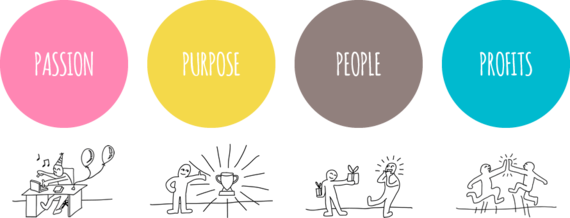Ten years ago I'd had enough of London agency life and all the nonsense around it -- too many egos, middle-men and pointless campaigns. Rather than stick around and moan about it, I decided to hook up with an old school friend with a view to doing things differently. We set up Spook Studio with a vision to create a company that put people and product before profits -- at the time a new concept for the agency world!
"Our motto was 'no suits or minions.'"
We wanted a flat, democratic structure that brought the best from the people we worked with.
This ethos has continued to this day as this year we were one of only 41 companies worldwide to appear on the prestigious WorldBlu list of the world's most democratic companies. We're not big on awards, but it was a great seal of approval for the way we do business -- particularly given that some of the other companies on the list were an inspiration for us when we started out such as Nixon McInnes and the game-changing Semco in Brazil (run by 'maverick' entrepreneur Ricardo Semler).
It's all about people.
If you've ever worked in a company before that had a real blame culture then you'll know it's not fun. Ever had a blamestorm? Shiver.
From my experience this manifests itself through a fear of making mistakes and ultimately a poisonous culture. We spend most of our waking hours at work so it's a tragedy to spend this valuable time in an environment where we can't be ourselves. You should never want to be the type of company that treats its employees with contempt, whatever the level -- we start from a position of trust and believe this is the cornerstone of a great company culture. People perform at their best when there's mutual respect and where they have autonomy to make their own decisions.
Positive failure
As we're at the forefront of entrepreneurship, it's vital that we give our employees freedom to experiment. Many larger organizations are following suit as they realize the importance of risk taking and boldness to innovation -- today's corporate worker needs to be more entrepreneurial than was traditionally the case.
"In an uncertain world where industries are being disrupted left, right and center no single person will have the answers."
We've seen first hand that a culture of openness, trust and freedom can lead to better outcomes for your company, its employees and customers. At the startup end, companies such as Buffer, Dropbox and Netflix are leading the way. Some have even said that Netflix's now infamous slidedeck about their company culture and hiring practices have reinvented HR.
Spreading the word
Last year we set up The Happy Startup School, with the aim of creating a more positive role model for business. We're helping the new breed of entrepreneur to realize their dreams -- those that put people first and place happiness before profits. These rookie startup founders want to create purpose-driven companies that value authenticity, openness and want to make a positive dent in the world, however small.
10 principles behind a democratic workplace
If you're interested in developing a more open and trusting company then these 10 principles developed by WorldBlu are a great starting point:
- Purpose and Vision: A democratic organization is clear about why it exists (its purpose) and where it is headed and what it hopes to achieve (its vision). These act as its true North, offering guidance and discipline to the organization's direction.
- Transparency: Say goodbye to the "secret society" mentality. Democratic organizations are transparent and open with employees about the financial health, strategy, and agenda of the organization.
- Dialogue + Listening: Instead of the top-down monologue or dysfunctional silence that characterizes most workplaces, democratic organizations are committed to having conversations that bring out new levels of meaning and connection.
- Fairness + Dignity: Democratic organizations are committed to fairness and dignity, not treating some people like "somebodies" and other people like "nobodies."
- Accountability: Democratic organizations point fingers, not in a blaming way but in a liberating way. They are crystal clear about who is accountable to whom and for what.
- Individual + Collective: In democratic organizations, the individual is just as important as the whole, meaning employees are valued for their individual contribution as well as for what they do to help achieve the collective goals of the organization.
- Choice: Democratic organizations thrive on giving employees meaningful choices.
- Integrity: Integrity is the name of the game, and democratic companies have a lot of it. They understand that freedom takes discipline and also doing what is morally and ethically right.
- Decentralization: Democratic organizations make sure power is appropriately shared and distributed among people throughout the organization.
- Reflection + Evaluation: Democratic organizations are committed to continuous feedback and development and are willing to learn from the past and apply lessons to improve the future.

